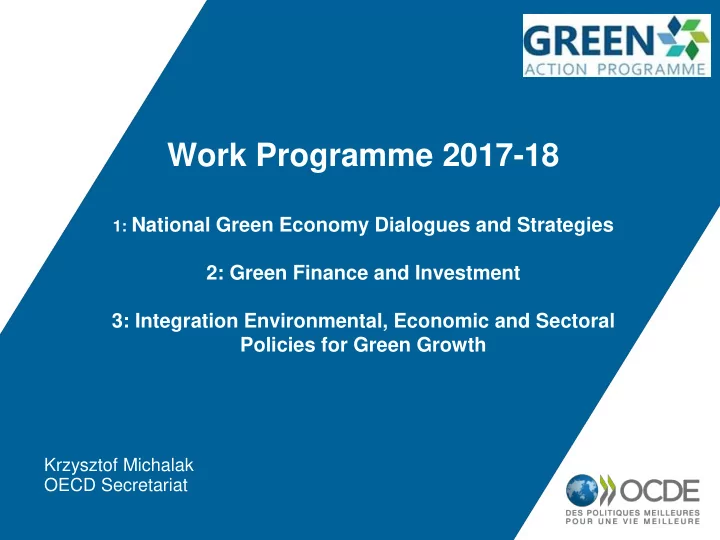

Work Programme 2017-18 1: National Green Economy Dialogues and Strategies 2: Green Finance and Investment 3: Integration Environmental, Economic and Sectoral Policies for Green Growth Krzysztof Michalak OECD Secretariat
Example of outputs 2015-16 • Regional analysis of energy subsidies in Armenia, Azerbaijan, Belarus, Georgia, Moldova and Ukraine • Environmental lending in the EU EaP region • Pilot projects on SMEs in Georgia, Ukraine and Moldova • Designing green priority public investment programme in Kazakhstan • Review of environmental regulations and support to the revisions of the Mining Code in Kazakhstan • Analysis of international climate finance in all EECCA • Study of green growth indicators in Ukraine • Regional SME greening guide • Regional handbook on the use of green growth indicators
Examples of results • Armenia Incorporation of results of the SME greening analysis to SME strategies and Green Economy (GE) concept; • Commitment of the Republican Union of Employers to implement simplified Environmental Management Systems for SME; • Development of green growth indicators; • Moldova Development of detailed amendments on greening SMEs to the SME Sector Development Strategy; • Development of green growth indicators; • Mobilisation of stakeholders to reform environmental product taxes and introducing Extended Producer Responsibility schemes; • Ukraine Incorporation of provisions for green growth measurement in the developed Environmental Strategy of Ukraine to 2030; • Re-launching the reform of Extended Producer Responsibility, with the focus on packaging waste; • Contribution of the reform of energy subsidies; • Kazakhstan Input to the revisions of the Mining Code; • Development of green growth indicators;
1. National Green Economy Dialogues and Strategies • In-country GREEN Action Platforms – Kazakhstan, G eorgia, Ukraine, Moldova, … • Analytical support to the development of country- level Green Economy/Green Growth Strategies
Green Economy Road Map Development in Moldova
2. Green Finance and Investment Greening public finance policy • Facilitating reform of environmentally-harmful subsidies (EHS) • Strengthening domestic public finance Facilitating access to finance for green investment, including climate finance • Facilitating access to private finance for green investments. • Turning Nationally Determined Contributions (NDCs) into green investment strategies • Strengthening national financial entities to scale up climate finance. Enhancing access to international finance for green growth. •
3: Integrating Environmental, Economic and Sectoral Policies for Green Growth Promoting “smart’ environmental regulations Reforming regulatory regimes for large emission • sources, including State Owned Enterprise Greening Small and Medium Sized Enterprises • (SMEs) • Developing policy instruments to address challenges of urban air pollution Integrating environmental and sectoral policies for green growth Addressing environmental impacts of mining • • Supporting the development of Extended Producer Responsibility (EPR) systems
3: Integrating Environmental, Economic and Sectoral Policies for Green Growth Measuring and assessing progress towards green growth • Broadening the use of green growth measurement • Assessing progress towards green growth in the EECCA region
Funding 2017-18 • European Union (EaP GREEN) • Germany (International Climate Initiative) • Switzerland • the Netherlands • …
WATER PROGRAMME PROGRESS 2015 – 2016 PLANS FOR 2017 & 2018 Matthew Griffiths OECD/GREEN Action Programme Task Force Secretariat
Progress since November 2015 • Launch of work under FinWaterWEI II – Kyrgyzstan and Tajikistan • Delivery of Kazakhstan country programme – Strengthening role of MPWI – Mechanisms and instruments of State Support to agriculture, rural development and water intensive industry • EUWI EECCA Working Group Meeting (May 2016) • Completion of EUWI project (May 2016) • Batumi Environment for Europe (June 2016) • National Policy Dialogues • Projects, studies and publications – Study for reform of economic instruments for WRM, Georgia – Establishing a sound economic regulatory system, Moldova
Strengthening water management • 4 thematic programme areas – Strengthening the economic and financial dimensions of water management including adaptation to climate change – Strengthening institutions and regulations for water management – Support to EECCA countries in addressing the water- food-energy nexus challenge and link to water security – Support to national and regional policy dialogues on water, communication and dissemination of programme results and regional reviews • 2 year programme – Project proposals, regional reviews
EUWI Plus • 4 year project, 6 Eastern Partnership countries • Improve management of water resources, in particular transboundary rivers • Convergence with WFD, IWRM and MEAs • Inception missions – Determine country needs and priorities • Work plan development, acceptance and launch • National Policy Dialogues (launch, relaunch, review mandate) • Sustainable capacity strengthening • Dissemination of results and regional development
Economics of Water Security in Kyrgyzstan and Tajikistan: FinWaterWEI II • Improve the use of water resources in Kyrgyzstan & Tajikistan • Increase water security through the use of economic instruments and analysis • Kyrgyzstan – Improving coherence between agricultural and water policies – Assistance in developing national definitions and indicators for water, food and energy security – Sustainable business models for rural areas and new standards for design and construction of small scale WSS • Tajikistan – Use of economic instruments to promote efficient water use in irrigation – Guidelines for regulation and monitoring of utilities – Guidelines for tariff calculations
Regional approach and new regional reviews • Annual regional meetings – Share progress and experiences, disseminate programme results • Nexus indicators – Integration at national level and replication in other countries • Progress towards achievement of SDGs – Regional baseline – Journey to 2020/2030 – Economic and financial barriers – Policy proposals: financially viable water sectors supporting vulnerable population • Regional outlook on water – Long term water outlook – Water demands and challenges: quantity & quality – Competing uses e.g. role of water for energy – Use of economic instruments & water allocation rules – Water/food/energy security
Thank you
Recommend
More recommend